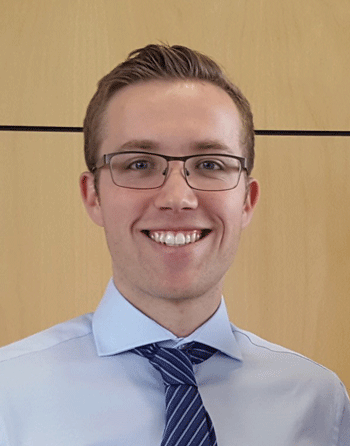Usher Syndrome type 1 is an incredibly debilitating disorder that combines deficits in the auditory, vestibular and visual systems. While the hearing loss and vestibular defects are present at birth, the loss of vision happens gradually.
When Kevin Booth started his thesis in the Interdisciplinary Graduate Program in Molecular Medicine at the University of Iowa, there were 10 genes linked to the Usher Syndrome, including the CIB2 gene. By the time he finished, there were only 9 genes and CIB2 was no longer on the list.

Booth became curious about whether mutations in the CIB2 gene do actually cause Usher Syndrome. He questioned whether the evidence in the published literature was strong enough to make that claim.
Mutations in the genes that are responsible for Usher Syndrome Type 1 encode a group of proteins that form intricate protein networks in both the inner ear and retina.
“They fit together like a beautiful puzzle, and it was unclear whether and how CIB2 fits in,” Booth remembers thinking when reading the 2012 paper linking mutations in CIB2 to Usher Syndrome.
Intrigued in understanding how CIB2 fits into the pathobiology of Usher Syndrome, he started his investigation in the Molecular Otolaryngology and Renal Research Laboratory with Professor Richard J. Smith.
Booth examined the genetic results of thousands of patients and identified a cohort of patients with CIB2 mutations. With his cohort selected, Booth started the tedious task of reviewing and gathering detailed clinical data for each patient. Everything he knew indicated that these patients should have balance problems, and based on the patient's age; some should also be blind.
“I reached out to clinicians and our collaborators all over the world to ask them to perform a full clinical exam on the patients we had identified,” says Booth, who earned his doctorate in 2017. “As the data started to come in, I got more and more convinced that the CIB2 gene had nothing to do with Usher Syndrome.”
The in-depth examinations revealed that the patients had perfectly healthy retinas and no balance problems.
The genetic evidence refuting CIB2’s role in Usher Syndrome was not enough for Booth, who wanted to understand the role of CIB2 in proper auditory function.
Using a comprehensive approach, which included in-depth phenotyping, human genetics, cutting edge genomic technologies, murine mutant models, and functional assays, Booth and a team of scientists from the Institut Pasteur in Paris showed that mutations in CIB2 do not cause Usher Syndrome.
Based on his findings, CIB2 is no longer considered an Usher-causing gene, and parents of these deaf children are no longer being told that their child would also develop a form of blindness called retinitis pigmentosa.
“These findings have transformed the clinical care patients with CIB2 mutations receive,” Booth says. “It truly exemplifies personalized medicine at its best—patient care steered by their genetics.”
This important discovery was a highlight of Booth’s dissertation research.
The Graduate College awarded Booth, who earned his doctorate in 2017, with the 2019 Rex Montgomery Dissertation Prize for his dissertation, “Unraveling the Hidden Complexities of Genetic Hearing Loss.” The dissertation prize is named after Rex Montgomery, a longtime professor of biochemistry and associate dean for academic affairs in the Carver College of Medicine from 1974-1995.
As a recipient of the Montgomery Dissertation Prize, Booth was nominated by the Graduate College for the CGS/ProQuest Distinguished Dissertation Award. Booth was a rare honorable-mention, runner-up selection among the finalists for the prestigious national award. Iowa now has 15 finalists in this national competition.
“As a graduate student, Kevin blossomed to become an independent, out-of-the-box thinker and scientist,” says Smith, UI professor of otolaryngology, molecular physiology and biophysics, pediatrics, and internal medicine, in his nomination letter on his former student’s behalf. “His thesis work provides novel insights into the pathobiology of deafness for over 150 genes. He has a passion for science, and for asking and answering new questions.”
Defining the genomic landscape
In an equally significant part of his dissertation, Booth and UI Research Scientist Hela Azaiez collaborated to define the genomic landscape and mutational signatures of all 152 known deafness-causing genes and generate an evidence-based classification for nearly a million genetic variants.
“Predicting if a variant in a gene is connected to the underlying pathology is very difficult,” Booth says. “Complicating issues is that data required to make a call is scattered and not centralized. That is not the case anymore.”
This task, two to three years in the making, created a roadmap for understanding deafness genes and their mutational signatures for the hearing loss community. This valuable database has become the primary source for for scientists, genetic counselors, diagnostic teams, and clinicians worldwide.
“Once you know the mutational signature of a gene, you can use that knowledge to better classify new variants seen in patients,” Booth says.
Booth is now a research fellow in neurobiology at the Harvard Medical School in Professor David P Corey’s lab.
“(Booth’s) landmark study illustrated how each gene is unique in its mutational and genomic landscape,” Corey said in his nomination letter on Booth’s behalf. “Already, his data are being used around the world to better understand gene function and provide more accurate genetic diagnosis for patients with hearing loss.”
Booth credits Professor Smith for helping him develop as a scientist.
“One of the great things about being in Richard’s lab is Richard and his mentoring style,” Booth says. “There is no one else like him. His passion and knowledge are unmatched. He fostered an environment that allowed me to try and fail and required critical thinking and independence. For his mentorship and friendship, I will forever be thankful.”